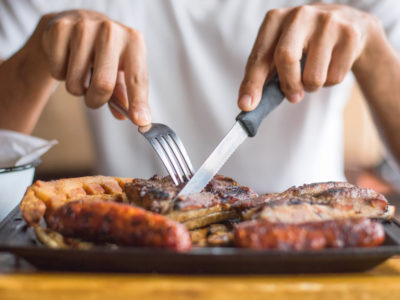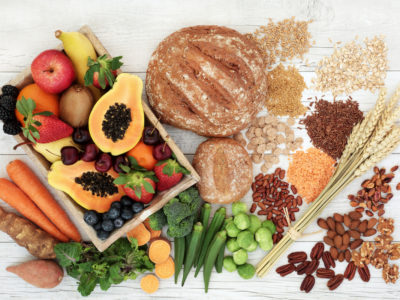Table of Contents[Hide][Show]
“You are what you eat!”
Chances are, you’ve heard—or even said—that common phrase. And it’s easy to see the correlation between food and health. Eat nutritious, good-for-you foods and you’ll see and feel the emotional and physical results: glowing skin, increased energy, better sleep, healthy weight, and more.
But the biggest benefits of a healthy diet go much deeper, venturing into disease-fighting territory.
Research has proven that certain foods can help our bodies fight or prevent illnesses and infections. For example, probiotic-friendly foods will boost immune response and combat digestive issues, while a diet rich in antioxidants can reduce the risk of heart disease, Parkinson’s, and more.
And then there’s cancer. With its high mortality rate and skyrocketing number of diagnoses each year, it’s certainly a disease that concerns many. Yet few people realize how their food choices can help ward off (or encourage and compound) this dreaded disease.
But the truth is, the link can’t be denied. Let’s explore how diet and cancer are connected, which foods you should incorporate into your diet to fight or even prevent cancer, and which foods you should avoid.
What Exactly Is Cancer?
“The Big C,” cancer looms large in the minds of many who are affected, or worried they will be.
But while some conditions, such as dementia or heart disease, are easily understood at a glance, the definition of cancer remains somewhat murky for many.
So, before we look at nutrition and cancer, let’s look at exactly what cancer is.
Your body is composed of trillions of cells that live a full life cycle within your body. When you’re healthy, these cells grow and form new cells (through a process known as cell division) as your body needs them. As the cells grow older or become damaged, they die off. Your body then produces new cells to replace them.
Cancer disrupts this simple, orderly process.
When cancer is impacting the body, damaged cells, which should be dying and getting replaced, multiply and create more of the damaged cells. These group together and form lumps of tissue, which we call tumors. Tumors can be benign (not cancerous) or malignant (cancerous).
Cancerous tumors will spread or invade nearby healthy tissues. They can even travel to other parts of the body to create additional cancerous tumors. And, adding to the abnormal behavior of cancer cells, sometimes they don’t form detectable tumors at all. Blood cancer, such as leukemia, never creates a solid tumor, but is no less dangerous.
Can You Fight Cancer with Nutrition?
What you put into your body affects all aspects of your health, including your body’s capacity to fight disease and illness. And as far back as the 1960s, studies showed correlations between nutrition and different types of cancer.
So if you’re wondering whether you can diet to prevent cancer, the answer is a resounding yes!
When it comes to nutrition and cancer prevention, there are two ways to approach it.
- Avoid foods that are known to be cancer-causing .
- Choose healthy foods that have been proven to prevent or fight cancer.
According to Harvard Medical School, less than 30% of the factors that determine your risk of cancer are the result of uncontrollable factors. This means that the vast majority of your cancer potential is controllable, including your dietary choices.
Which Foods Encourage Cancer?
There’s no “magic food” that you can cut out to completely eliminate your risk of cancer. But, if you’re trying to fight cancer with food choices, there are certain foods that you should avoid as much as possible. These foods are known as carcinogens, which means they are capable of causing cancer.
Meat
The biggest carcinogenic culprits are undoubtedly found in the meat group. The World Health Organization (WHO) has broken them down even further.
Processed meats are a Group 1 carcinogen, meaning that there’s strong evidence that they cause cancer. Some of the products in this group include ham, bacon, salami, and hot dogs. More specifically, they can increase your risk of bowel and stomach cancer.
Red meat is a Group 2 carcinogen, which means it probably causes cancer. This includes beef, lamb, and pork (“the other white meat” is actually red meat!).
Not convinced? Here are a couple of stunning facts, courtesy of the Cancer Council.
- Eating more than 24 ounces of red meat per week increases your risk of bowel cancer.
- Your risk of developing bowel cancer increases 1.18 times for every 1.7 ounces of processed meat you eat per day.
Related
Can Too Much Protein Cause Inflammation?
Too much protein can hurt your body in more ways than one. Learn how it increases your risk of inflammation below.
Alcohol
Suffice to say, there are numerous reasons for controlling your alcohol intake. Cancer is only one of them. If you are optimizing your diet to reduce cancer risk, alcohol needs to be kept to a minimum.
Take breast cancer, for instance—the most common type of cancer. There are numerous factors that increase the risk of breast cancer, including drinking alcohol. In fact, studies show that the risk of breast cancer increases by 10% for every glass of alcohol consumed daily.
There is also strong evidence linking alcohol to other cancers, including those of the mouth, pharynx and larynx, oesophagus, colorectum, liver, and stomach.
To reduce your risk, experts recommend that alcoholic beverages should be limited to no more than 1 drink (women) or 2 drinks (men) per day.
Which Foods Prevent Cancer?
Now that we’ve gone over some of the foods you should avoid, let’s look at which foods can help you fight the good fight. Generally, any whole foods are best as they are unprocessed and have all the right nutrients and phytochemicals for maximum health benefits.
Here are some recommendations from the American Cancer Society (ACS) for the best cancer fighting foods:
- Your diet should be high in fruits and vegetables, with at least 2 1⁄2 cups of fruits and veggies per day being optimal. Servings of cruciferous vegetables such as broccoli, cauliflower, cabbage, and kale are especially effective in reducing tumor growth. Broccoli is particularly beneficial for fighting risk of colorectal cancer. Citrus fruits are also helpful as they are shown to reduce risk of esophageal cancer. Fruits and veggies high in carotenoids like lycopene (tomatoes), beta-carotene (carrots), and lutein (spinach) provide cancer-fighting antioxidants that offer a decreased risk of prostate, stomach, and lung cancer.
- Choose omega-3 fatty acids (fish, flaxseed oil, walnuts) over omega-6 fatty acids (corn oil, sunflower oil). Omega-3 fatty acids have been linked to a reduced risk of prostate cancer.
- Try to limit your intake of grains. And, when you do eat grains, choose whole grains such as brown rice or quinoa.
- Certain spices such as curcumin, found in turmeric, can potentially reduce cancerous lesions because of its anti-inflammatory properties. Curcumin is especially effective in lowering the risk of colon cancer. Some studies have shown that cinnamon may also prevent the spread of cancer cells.
- Make healthier meat choices, such as fish, poultry, and eggs. You can still get the protein, iron, and other valuable nutrients you need, but with a much lower risk of cancer.
Fiber
When we talk about how to fight cancer with food, fiber deserves a special mention. A diet that contains foods high in fiber can significantly cut your risk of bowel cancer.
Fiber is found in fruits, vegetables, and whole grains. Although all of those options are healthy, the fiber found in whole grains is more effective at fighting cancer.
Your body can’t break down fiber easily, so it moves into your bowels. There, it attaches to and helps eliminate waste. This means the bacteria and other harmful chemicals found in waste spend less time in your body.
On top of that, fiber promotes the production of butyrate by the bacteria in your bowels. Butyrate is a fatty acid that helps the bowel’s cells stay healthy, so tumors are less likely to develop.
Rice, oatmeal, legumes, sweet potatoes, ground flax seeds, chia seeds, and even popcorn are all good sources of fiber.
Related
Fiber 101: An In-Depth Guide
Learn the difference between soluble and insoluble fiber, the best way to add it to your diet (as well as what to avoid), and some of its biggest health benefits of fiber.
A Plant-Based Diet for Cancer?
Since you should be limiting your meat consumption (based on the foods to avoid, above), you might be moving towards a plant-based diet. But, this doesn’t mean that you won’t eat meat at all.
A diet is considered plant based when two-thirds of what you eat comes from plants. A nutritionally-sound plant-based diet includes a variety of delicious foods:
- Fruits
- Vegetables
- Grains
- Nuts
- Seeds
- Legumes
- Plant-based proteins (such as tofu)
Of course, not all plant foods are nutritious. You should still focus on making healthy choices!
Highly processed and refined foods such as white rice or regular pasta have had much of their nutrients stripped away. Reaching for rice cakes instead of crackers is an easy, nutritious, and tasty snack-time substitution.
Should You Follow a Weight Loss Diet to Prevent Cancer?
When it comes to diets that prevent cancer, it’s not just what you eat, it’s also how much you eat that can make a difference.
In an ideal world, your eating choices are part of an overall healthy lifestyle that includes both nutritious foods and plenty of physical activity. This will not only help you look and feel better, but it will also help you control your weight.
Because believe it or not, how much you weigh will influence your body’s cancer-fighting abilities.
In fact, being overweight or obese can lead to higher risk for certain types of cancer, including those of the:
- Breast (in women past menopause)
- Colon and rectum
- Endometrium
- Esophagus
- Liver
- Pancreas
- Kidney
How does being overweight increase your risk of cancer? The main culprit is your hormones. Excess weight causes your body to produce more estrogen and insulin. Both of these are hormones that stimulate cell growth, including the growth of cancer cells.
Managing your weight by filling your plate with nutritious choices, such as those we mentioned above, can be one of your biggest allies in the cancer fight.
Final Thoughts
There is no denying the link between nutrition and cancer prevention. Ideally, a diet that fights cancer effectively will have two focal points.
Eliminate or reduce the consumption of known carcinogens, including processed meats, red meat, and alcohol. Then, up your intake of cancer-preventing foods such as fruits, vegetables, and fiber. And don’t forget to get enough protein (from healthy sources!) to make up for the reduction in red meat.
The statistics surrounding cancer are beyond alarming: 1 in 3 people will be diagnosed with cancer at some point in their lifetime. But by making the best dietary choices, you can give yourself a fighting chance!
You May Also Like…






